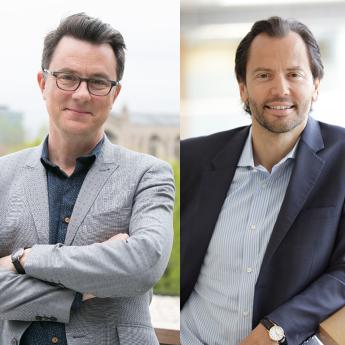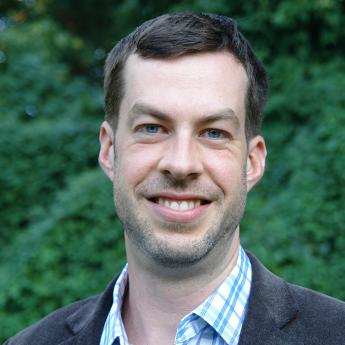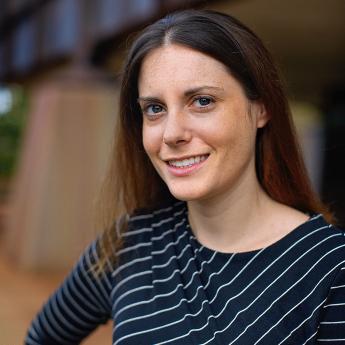Show Notes
Mosquito-borne diseases are one of the greatest global health threats, infecting around 700 million people every year with Zika virus, dengue fever, malaria and yellow fever — which can all be deadly if left untreated. Unfortunately, the mosquito population is not slowing down, and factors like climate change and increased global travel are broadening the mosquito’s range. The effort to stop the mosquito is not an easy task; insecticides and vaccines can't completely stop the spread of these diseases. But instead of trying to kill mosquitoes, one nonprofit is taking a unique approach.
Scientist Scott O’Neill is founder and CEO of the World Mosquito Program, a nonprofit group with the goal of eliminating mosquito-borne diseases. The program is implementing a new method of inoculating the wild population of mosquitoes with a bacteria called Wolbachia, which is resistant to diseases. So far, the program has been rolled out in countries like Brazil, Colombia, Indonesia, Australia and Mexico – and has already seen success in reducing rates of disease.
Link to the advertised Chicago Booth Review Podcast.
Subscribe to Big Brains on Apple Podcasts and Spotify.
(Episode published March 7, 2024)
Subscribe to the Big Brains newsletter.
Please rate and review the Big Brains podcast.
Related:
- Scott O’Neill hopes to go out of business with his disease-fighting program — Vox
- Massive mosquito factory in Brazil aims to halt dengue — Nature
- Release the mosquitos! How 5 billion bugs will help fight dengue fever in Brazil — CBC/Radio-Canada
Transcript:
Paul Rand: The University of Chicago Leadership and Society Initiative guides accomplished executive leaders in transitioning from their long-standing careers into purposeful encore chapters of leadership for society. The initiative is currently accepting candidates for its second cohort of fellows. Your next chapter matters for you and for society. Learn more about this unique fellowship experience at leadforsociety.uchicago.edu.
We’ve all had the experience of spending a nice summer night outside, only to end up with a ton of itchy mosquito bites. And while these bugs can be annoying, some of them can also be quite dangerous or even deadly.
Scott O’Neill: The mosquito is doing really well globally.
Paul Rand: Like it or not, mosquitoes are all around us and their population around the world is growing.
Scott O’Neill: Certainly now, it’s even worse. Places we have been successful in the past, the mosquito is re-invading. It’s increasing its range, it’s increasing the elevation that it occurs at, and so it’s a big, big problem.
Paul Rand: That’s scientist Scott O’Neill. He’s the founder and CEO of the World Mosquito Program, a nonprofit group with the goal of eliminating mosquito-borne diseases.
Scott O’Neill: The problem is that these diseases are getting worse, they’re not getting better.
Paul Rand: Globally, nearly 400 million people are infected with a mosquito-borne disease every year, and that kills around 700,000 people. You’re probably familiar with some of these diseases like yellow fever, West Nile virus, and Zika, or malaria. But according to the World Health Organization, the most critical mosquito-borne illness today is dengue fever.
Speaker 3: The illness has long been a scourge in much of Asia and Latin America, causing an estimated 20,000 deaths each year.
Scott O’Neill: Dengue is just out of control around the world at the moment, getting worse.
Speaker 4: More than 4.2 million cases were reported around the globe in 2022. Around 20,000 infected patients died from the disease.
Paul Rand: For the past few decades, Western countries have largely been spared having to deal with the worst of these mosquito-borne illnesses.
Scott O’Neill: So why should you care about this? Well, I think, regardless of where you live, we should have some compassion for the suffering and the lives people live, maybe not in our country, but if you need self-interest to be motivated, well, these diseases are coming to a town near you.
Speaker 5: An illness that’s usually found on the other side of the world has been discovered in our area, and it did not involve travel. We’re talking about dengue fever, which is spread through mosquitoes.
Speaker 6: 11 cases of the dengue virus are now reported this week in Broward and Miami-Dade Counties. This has forced the two counties to put residents under alert for the mosquito-borne virus.
Paul Rand: You might think, “Well, there’s a simple solution here. We just need to break out the bug spray.”
Scott O’Neill: As soon as we found out that mosquitoes were transmitting all these diseases to people, the first immediate response was, “Well, let’s kill the little suckers.” The problem is they’re really hard to kill, and we really haven’t worked out good ways to kill them. Insecticides don’t work as well as they used to work. We’ve never been able to really kill the mosquito very effectively.
Paul Rand: So O’Neill started the World Mosquito Program to answer this problem. And while struggling to make their initial idea work, they actually stumbled into what may be a global solution.
Scott O’Neill: You know, science has this way about smacking you in the face every now and then and saying, “No, you can’t do that,” and showing you stuff you hadn’t realized, and makes you point in a different direction, or in our case, we were really quite lucky.
Paul Rand: What O’Neill and his team discovered was remarkable. Instead of trying to kill the mosquitoes or even shorten their lifespan, they could actually give them an immune-fighting bacteria to stop transmitting viruses.
Scott O’Neill: These diseases are horrific and create real problems for people. And if we have a way to stop that, I would like to see the most number of people benefit from it, and so I want to push it out.
Paul Rand: Welcome to Big Brains, where we translate the biggest ideas and complex discoveries into digestible brain food. Big Brains, little bites, from the University of Chicago Podcast Network. I’m your host, Paul Rand. On today’s episode, why mosquitoes are becoming one of the world’s greatest health threats, and how one program hopes to eradicate the problem.
Wonder if I can get a baseline understanding for folks, just how do mosquitoes contract and transmit diseases?
Scott O’Neill: Most mosquitoes are completely harmless. They don’t cause any problems for people, but some mosquitoes do, and the ones that do are the ones that really like to bite people. So the mosquito that transmits all of these virus diseases, dengue, Zika, chikungunya, yellow fever, a mosquito is called Aedes aegypti. It’s an African-origin mosquito, it’s a black and white stripe, quite beautiful mosquito, and it’s naturally healthy.
It doesn’t have these viruses naturally. The mosquito has to have bitten somebody about a week earlier than a bit you. And that person had to have one of these viruses in their body that it picked up, and then the virus replicates and grows in the body of the mosquito, and then a week to 10 days later, it’s ready to spit out the virus in its saliva when it bites someone else. And the mosquito that’s so good at transmitting these diseases likes to bite people every day. Rather than going and having a huge meal, like a snake or something, and then sitting and digesting it for a large of time, this mosquito comes and just has a little sip of your blood, and then goes away, and then we’ll come back later to have another small sip.
And that way, it’s much less of a target for being swatted on your arm, or your leg, or whatever, and it’s able to get in against your defenses and back out again without you even knowing that you’ve been bitten.
Paul Rand: And is it my understanding that, really, only female mosquitoes can transmit?
Scott O’Neill: Only female mosquitoes bite people?
Paul Rand: Ah, I never knew that. Okay.
Scott O’Neill: Yeah, only females bite. And they do that because they want your protein, which they get from your blood, and they use that protein to grow their eggs, whereas the females live a lot longer and they need to come back and bite people repeatedly to keep getting protein, to keep laying more and more eggs.
Paul Rand: You can think of female mosquitoes like little blood-sucking vampires on a mission to transmit viruses from person to person. And unfortunately for us, human actions are making it easier for them to do their job.
Scott O’Neill: So this mosquito that transmits all these diseases, it doesn’t live out in the forest. It doesn’t live in the mangrove swamp and become food for fish, like other mosquitoes might be. This mosquito prefers to live in a city like Bangkok, or São Paulo, or a concrete jungle, if you like. And why it likes that is because it’s just full of people. It’s just one enormous buffet of people. So it wants to be amongst the smell of your clothing, it likes to be in your bedroom, it likes to lay its eggs in the pot plant vase that you have, or around your urban environment. And so it’s a specialist urban mosquito, and that’s the reason it’s such a good disease vector.
So as humans are building out huge cities in the tropics or just amassing in more and more urban areas, and our global population gets more urbanized, we’re seeing these really rapidly-growing cities. They can’t keep up the infrastructure of piped water, of garbage collection, and etc., particularly in the slum areas. And these are perfect breeding grounds for a mosquito that transmits the viruses we’re talking about. And so the mosquito population’s getting bigger. And then on top of that, you have billions of people catching aeroplanes each year, and those people are just carriers of viruses to the mosquitoes in these locations. And so we’re getting all of this circulation of viruses that we’ve never had previously.
Paul Rand: But it’s not just airplanes and rapidly growing cities that are contributing to the mosquito population. There’s an even greater existential threat that we’re all familiar with.
Scott O’Neill: Just the icing on the cake, if you like, for the disease perspective is climate change. And in climate change, we have two things happening. We’ve got temperature increasing, which makes great for mosquitoes, great for transmission of the viruses, but the piece that people don’t often catch onto is changes to water use that are associated with climate.
When water becomes more difficult to get or more unreliable to get, you store it, store it for a rainy day, but not for a rainy day, for a dry day. And though, that stored water is perfect for this mosquito. So when you add all of those factors together, including this increasingly new problem of climate change, it’s just perfect for these diseases to increase.
Paul Rand: Out of all the mosquito-borne diseases, dengue fever is grabbing the most headlines these days. Brazil is currently experiencing a massive outbreak, with more than 4 million cases expected this year, the same amount recorded for all 42 pan-American countries in all of last year. And experts say that this outbreak could surge north to the US.
Scott O’Neill: Yeah, it’s actually four different families of viruses that make up dengue. Unfortunately, they’re all called dengue, unimaginably they’re called dengue one, dengue two, dengue three, and dengue four. Usually, if you get a virus or something, you make antibodies against it, and then those antibodies will protect you from getting it again. Well, the problem with dengue is that if, say, you get dengue one, the antibodies that you make will actually bind to dengue two, three or four, and carry them into your cells. And rather than killing the virus, the virus will grow in those cells. And so it becomes a very difficult virus to utilize immune-based responses like a vaccine.
Paul Rand: Talk to me, if you would, about what are the symptoms, short-term and long-term, of dengue?
Scott O’Neill: So some people, it’s just like the Covid story, some people have none, they’re completely asymptomatic. Other people have described it to me like the worst hangover they’ve ever had that lasted a week. And then some people tell me that if they’re very sick, that they can’t get out of bed to even go to the toilet. They’ve got piercing headache between their eyes, all of their bones start to feel in their body like they’ve been broken, and they wish they were dead. And then there’s the other people that can’t give me a response because they are dead.
And so you get the full spectrum of illness, from killing people right through to people hardly noticing or not noticing at all that they are... And the problem is those people that don’t show any symptoms are good transmitters of the virus. And so it makes it harder to control, because you’ve got just cases magically appearing of sick people randomly across the landscape, which makes it very challenging to direct your mosquito control efforts.
Paul Rand: And in addition to the health implications, there certainly are economic implications as well, aren’t there?
Scott O’Neill: All the mosquito-transmitted diseases put huge development breaks on countries. They stop wage earners from being able to work, they keep children out of school. It’s like a slow-grinding handbrake applied to the vehicle of economic development of the country, which puts a huge problem on the economies of developing countries.
Paul Rand: And like you said, this spreads then, because people spread themselves, and then of course that virus can go with them.
Scott O’Neill: Absolutely. It’s actually the mosquito, this mosquito hardly moves at all. And if it can access people to bite and a place to lay eggs, it won’t move.
Paul Rand: So you would think that if these mosquitoes barely move, wouldn’t we be able to catch them, or better yet, kill them?
Scott O’Neill: The primary tool of choice to control these diseases is being, “Kill the mosquito,” and we kill the mosquito by spraying insecticides, and ideally insecticides that are very visible, like a truck with a fogger going down the road that you can see all this stuff coming out the back, and people love that. “The government’s doing something to help here. They’re active, they’re involved, they’ll look after us.” But the problem, when you look at the actual disease numbers is it doesn’t help, and the disease numbers go unabated. And the reason is the insecticides are just not killing the mosquitoes anymore, they’re resistant to them.
Paul Rand: So they’re adaptable, in other words?
Scott O’Neill: Yeah, just like antibiotics don’t work as well for humans because we’ve used them so much, insecticides don’t work so well at killing insects anymore. They’ve found ways, trickery, to get around them with their own bodies, their own metabolism to detoxify the poisons.
Paul Rand: So if insecticides don’t work, then what other solutions do we have?
Scott O’Neill: From my perspective, I’d prefer, rather than we try, and kill, and spray all these toxins into the environment that kills everything that flies around, anything insect-like, I’d prefer if we could just make them harmless to people, and that’s what we work on, is a strategy that prevents the mosquito from being able to transmit the virus between people without needing to kill the mosquito.
Paul Rand: O’Neill and scientists around the world have been working on a strategy to stop the mosquito from spreading diseases. The collaboration is called the World Mosquito Program. We’ll learn about what they’re doing to stop mosquitoes after the break.
If you’re getting a lot out of the important research shared on Big Brains, there’s another University of Chicago podcast network show you should check out. It’s called Entitled, and it’s about human rights, co-hosted by lawyers and New Chicago Law School professors, Claudia Flores and Tom Ginsberg, Entitled explores the stories around why rights matter and what’s the matter with rights?
How can we improve communications at work? Why did McKinsey’s former CEO go to prison? How irrational are we really, according to Chicago Booth’s Richard Thaler and Harvard’s Steven Pinker, and are stock markets actually efficient? The Chicago Booth Review Podcast addresses the big questions in business, policy, and markets, with insights from the world’s leading academic researchers. We bring you groundbreaking research in a clear and straightforward way. Find the Chicago Booth Review podcast wherever you get your podcasts.
Tell me how in the world you got interested in being a so-called mosquito expert.
Scott O’Neill: You know, it’s like a lot of kids when they’re young, that they like to get out, and chase insects, and peel the bark off trees, and capture stuff, and put it in jars and stuff, I wasn’t one of those people, but I was interested in entomology. But it came to me very late, when I was a student, late, and I was just really impressed with the beauty of insects when I got to see them under a microscope, and I wanted to stay in that area in general. And what seemed like the place to be was in medical entomology, mosquitoes and suchlike, because it was a pretty understudied area, and the impact was really big that these insects were having on human health. And so I was quite interested in doing that.
Paul Rand: O’Neill’s research led him to become obsessed with a certain little bacteria.
Scott O’Neill: I’ve been working on this thing called Wolbachia, and it’s a bacteria that lives in insects that has some pretty interesting properties. And so Wolbachia is this very interesting bacteria that lives inside the cells of insects, and it’s in 50% of all insects. I can guarantee you’ve probably eaten it this week, not knowing, because insects or in our food supply. Believe me, there’s a lot of insect species on this planet, and so that’s a lot of different hosts.
Paul Rand: Can you tell me what in the world Wolbachia is?
Scott O’Neill: Yeah, it’s a mouthful, to start with, most people trip as you did, “Am I pronouncing that correctly?” Our whole shtick, if you like, at the beginning with this, it was about life shortening. We wanted to shorten the lifespan of mosquitoes to stop them transmitting, and there was a strain of Wolbachia that had been shown to shorten lifespan in fruit flies. And so we wanted to see whether we could transfer it across into the mosquito and shorten the lifespan of the mosquito.
Paul Rand: But as they were tinkering with Wolbachia, they made an even more startling realization.
Scott O’Neill: You know, I’m sure you and most of your listeners would identify with, that’s that mosquito that you can hear at about 1:00 or 2:00 in the morning buzzing around your head-
Paul Rand: Yes, yes.
Scott O’Neill: ... and get one in your bedroom, it’s so annoying. You’re smacking yourself in the head, trying to kill it or whatever, that’s a common house mosquito. That mosquito occurs throughout the world, nearly everybody gets bitten by it. It naturally has Wolbachia, and it doesn’t transmit any viruses to us.
Paul Rand: It turns out that the naturally-occurring Wolbachia in that mosquito offers it antiviral protection. In other words, they can’t catch viruses and replicate them.
Scott O’Neill: But it doesn’t occur naturally in this one mosquito.
Paul Rand: That one mosquito is, of course, our friend from earlier that’s responsible for deadly viruses like dengue fever, yellow fever, and Zika. Scientists have discovered that it doesn’t naturally have the Wolbachia bacteria.
Scott O’Neill: The challenge for us was, “Could we put it into this mosquito?” and what effect it would have. When we got the Wolbachia into the mosquitoes to investigate this life-shortening strategy, we found that you didn’t need life shortening. You just need to put Wolbachia into the mosquitoes and they couldn’t transmit these viruses anymore. It was completely astounding. And so we shifted gear very quickly to pivot and start working on that strategy, and taking that forward.
Paul Rand: You know, it almost brings up the analogy of you’re vaccinating these mosquitoes?
Scott O’Neill: In a way, it’s a bit like that, yeah, or vaccinating the landscape, if you like. The thing that’s very different about it though is that the mosquitoes transmit this Wolbachia to their offspring, to their children through their eggs. When you use a vaccine, you have to vaccinate children every year to maintain a population of vaccinated individuals, but you don’t need to do that with this method, because the Wolbachia gets inherited and pushes itself into the insect population.
Paul Rand: And so in terms of getting to this concept, did the process involve CRISPR technology to any sort?
Scott O’Neill: No, no. So we don’t use any GM technology in what we do. There’s no gene drive, no GM mosquitoes, nothing like that. Our view was GM mosquitoes, it’s going to be hard for the general public to come to terms with accepting, at least in the short term.
Paul Rand: Okay. You talk about quote/unquote this “method”, how in the world are you getting Wolbachia into these mosquitoes?
Scott O’Neill: Yeah, so this causes some confusion with people, because people, we say that we injected Wolbachia into the mosquito and then people think, “Well, you injected every... How can you inject millions of these mosquitoes that you’re letting out?” But it’s not actually what happens. So we had to do the injection once successfully. We did the injection many, many times unsuccessfully, but we only had to do it once successfully, because the Wolbachia gets inherited and passed to the eggs. So once you could do it successfully, you can then just maintain a colony of these mosquitoes that has Wolbachia, and then you grow them up in the lab, and you let them go into the field, and they mate with the wild mosquitoes, and they transfer Wolbachia into the natural population of mosquitoes. And then Wolbachia increases in frequency until all the mosquitoes in an area have Wolbachia.
Paul Rand: The technique that O’Neill and his collaborators are using is called the Wolbachia Method.
Scott O’Neill: We did our first releases 13 years ago now in Northern Australia, and we released for 10 weeks, and the mosquito population quickly, the Wolbachia went up to 98% and has maintained itself at that level now for 13 years. We haven’t had to go back and re-release or do any sorts of activities. Now, we don’t have dengue in Northern Australia, and so it’s hugely cost-effective, because you only have to do it once.
Paul Rand: In essence, you’re kind of getting almost a starter kit. And then if you think about it, if it’s that simple, do you transmit and say, “Listen, we just have to get starter kits into different populations, and they’ll do the work from there”?
Scott O’Neill: That’s exactly right. So we just have to release into certain areas and then the Wolbachia will take care of the rest.
Paul Rand: So far, the Wolbachia Method has already been deployed across the world.
Scott O’Neill: We’ve been working on around 14 countries at the moment. We’ve provided this solution to around 11 and a half million people, and what we are seeing is quite dramatic impacts.
Paul Rand: The World Mosquito Program has seen astounding success. One of the most impressive trials was in Indonesia, a place that was struggling with dengue fever outbreaks. Scientists divided one study site into 24 clusters, then they released Wolbachia mosquitoes into only half of the clusters. Over the course of the next two years, scientists surveyed the study participants to see if the Wolbachia cluster saw a decrease in dengue fever.
Scott O’Neill: And we were able to measure, with this method, in a very sophisticated trial design, a 77% reduction in virus-infected people, and an 86% reduction in hospitalization.
Paul Rand: But the Wolbachia method isn’t just effective at reducing the transmissions of dengue fever. It has also worked on Zika, chikungunya, and yellow fever.
Scott O’Neill: We started on dengue. When we found out that it controlled all these other diseases as well, we first called ourselves the “Eliminate Dengue Program”, and somehow it didn’t sort of ring, once we realized it could control chikungunya, Zika, all these other viruses. And so with the help of a public relations company, I did a branding exercise with us, and voilà, World Mosquito Program popped out the back end of that.
Paul Rand: I imagine at some point, Scott, in your life, somebody told you, “Go big or go home.” You didn’t come up with “My Local Neighborhood Mosquito Program”. You decided you were going to go with the World Mosquito program, so you have big ambitions for what you’re planning here.
Scott O’Neill: Yeah, yeah. I’ve never been accused of having small ambition.
Paul Rand: That’s how world changes get made.
Scott O’Neill: Yeah. So firstly, we’re not-for-profit, we’re not commercial in what we do. And we’re really about wanting to transfer the technology and the understanding of what we’ve done to help other governments to be able to utilize it. And our mission is really quite simply articulated, and that is we want to get this intervention to the most number of people to benefit from it in the shortest amount of time. We’ve just come out the back of a phase that was all about efficacy generation, how well does this thing work and how safe is it? And we’ve come out the back of that, and the efficacy is really good, and it looks very safe, and it looks actually cost saving in many parts of the world for governments to implement it.
And so really, the phase we’re now entering is about scale up, is really to justify having the name, the World Mosquito program. And so what we’re wanting to do is target locations where we work with countries. And really, while we’ve gotten this far with a lot of help from big philanthropy, the future is about governments, and governments funding it, because philanthropy is not able to do the scale-up that’s required. Only governments can do that. And we’re committed to working with governments to help them understand how to use the technology must effectively, and an example of that is Brazil.
Paul Rand: Today, Brazil has the highest number of dengue cases in the world, making it a prime location for the World Mosquito Program to expand its operations. And this year, they plan to open the world’s largest mosquito factory there.
Scott O’Neill: So if you look at Brazil, it’s got a massive population all centered in the tropics or subtropics, and has huge amounts of disease. And so if we want to implement the technology across Brazil, you have to be able to implement it in a large number of cities. 30 cities have to be treated at a minimum, many more than that likely. The constraint becomes how many mosquitoes can you put your hands on to put out into the field? And so having production facilities, very important. So we’ve entered into an arrangement with the Brazilian government, a joint venture, where we’re working with core partners, Fiocruz in Brazil, which is a very well-respected institution, public health space, and working with an affiliated company to build the world’s biggest mosquito production facility, which will, in another year’s time, will be producing the mosquitoes to be deployed across different cities in Brazil.
Paul Rand: But not everyone is so certain. The World Mosquito Program was on track to deploy dengue-fighting mosquitoes in Bali, but concerns about the public’s reaction led the government to put the plans on pause.
Scott O’Neill: The two top concerns are, and it doesn’t matter who you speak to about, it’s always the same two concerns, it doesn’t matter what country you are, what education level. The first is, “What’s the risk to me as an individual if these mosquitoes bite me? Are they going to make me sick in some way that you don’t understand?” It’s number one. Number two, “What are the unintended consequences for the environment about this? Is it possible you’re an ego-driven scientist, and actually, something’s going to go wrong here that you haven’t considered?”
So those are shaped in different ways, but those essentially are the two. A bunch of risk analysis is being done by independent groups, it’s published, etc. All of the risk analysis comes up with negligible risks, which reinforces the intuitive view that it’s already all around us. It’s unlikely to cause any major problems for us. And so I think the bigger worry for me is not unintended consequences, it’s how long will it maintain its effectiveness?
Usually, anything you do in the biological realm, you should expect some evolutionary response to it. And so then the question is, “What’s the resistance profile going to look like with this intervention? Surely, we’re going to see some sort of resistance in the future.” And me as a biologist, I would say, yeah, but the thing we don’t know is how quickly that resistance will develop. Will it develop in two years? Will it develop in 40 years? Will it take 5,000 years to develop? And so answering that question is the critical question, and it’s a hard question to answer. At the moment, we’re seeing no sign of resistance developing in any sites, so it’s not going to be really rapid.
And we think part of the reason it’s not very rapid is because Wolbachia’s genome is quite stable. It doesn’t seem to accumulate mutations very quickly. The other thing in our favor is it looks like it’s a very complicated mode of action Wolbachia has to stop these viruses, with more than one possible mode of action occurring simultaneously. We still need to wait and see when we might start seeing resistance, but certainly, we’ve seen nothing yet. We’ve seen no signs of it. We can’t select for it in a laboratory. It looks like, if it’s going to come, it’s going to take a considerable amount of time. And in that time period, we could have a major impact while we’re waiting for other tools to be developed.
Paul Rand: Tell me, then, is the only thing getting in your way money at this point, or is it a matter of continued education, and then funding again? When we are facing the type of crises that you talked about facing, what gets in your way of expanding more quickly, and is that frustrating for you?
Scott O’Neill: Yeah, it’s frustrating. I think what we’re doing is fairly innovative in the mosquito world. Everybody that thinks about mosquito-transmitted diseases thinks about, “How do you kill these mosquitoes?” Here we are saying, “Actually, we’re going to grow mosquitoes and release them, and that’s going to control the disease for you.” And people are going, “Oh, yeah, okay. Why don’t you try it over there first and we’ll look at that, how it goes there, and then you can come and talk to us at that point?” So this is the problem of just innovation, an uptake of innovation, anything new, there will be some early adopters or some people that will dive in, which we’re seeing, say in Brazil, for example. Other places are more hesitant, and it depends on many factors.
I would like to see uptake, yeah, accelerate, absolutely, because, for two reasons, one reason, the longer we take to implement, the more likely resistance will develop. So we won’t get the biggest benefit from it. And so we should try and implement it quickly, so we get the most impact from it for the longest amount of time. And the second is that I believe in it, and I would like to see people not have to be worried if a woman is pregnant, whether her baby will be delivered a healthy state and so terrified. I don’t want to see any more pictures of babies being born deformed into a poor family, where there’s no state-based support for that family And how are they going to look after this child until it probably dies before it’s 10?
And you know, these diseases are horrific and create real problems for people. And if we have a way to stop that, I’d like to see the most number of people benefit from it, and so I want to push it out. The point I would like to reinforce is that we’re not commercial. We’re not driven by shareholder value. We are driven totally about by public health return. And for us, it’s about wanting to take our discovery and make it available to people so they can benefit from it. Once that’s done, we all pack up and find another job to do. We’re all going to die poor, the people that work with me, but so be it. But at least our karma balance will be good.
Matt Hodapp: Big Brains is a production of the University of Chicago Podcast Network. We’re sponsored by the Graham School. Are you a lifelong learner with an insatiable curiosity? Access more than 50 open enrollment courses every quarter. Learn more at graham.uchicago.edu/bigbrains. If you like what you heard on our podcast, please leave us a rating and review. The show is hosted by Paul M. Rand, and produced by Lea Ceasrine, and me, Matt Hodapp. Thanks for listening.
Episode List
How Alternate Reality Games Are Changing The Real World with Patrick Jagoda and Kristen Schilt (Ep. 59)
UChicago scholars design ARGs to address issues ranging from climate change to public health
What Remains Unanswered After The 2020 Election, with William Howell and Luigi Zingales (Ep. 58)
UChicago economist and political scientist discuss the polls, what lies ahead for Biden and the country post-Trump
When Governments Share Their Secrets—And When They Don't, with Austin Carson (Ep. 57)
Scholar discusses the political theater of foreign policy—and the case for declassifying intelligence
How We Can Fix a Fractured Supreme Court, with Geoffrey Stone (Ep. 56)
Legal scholar examines how nomination of Amy Coney Barrett could tip an increasingly politicized bench
Correcting History: Native Americans Tell Their Own Stories (Ep. 55)
How scholars helped a Chicago museum rethink its representation of Indigenous peoples
The Future of Voting And The 2020 Election, with Assoc. Prof. Anthony Fowler (Ep. 54)
A leading political scholar discusses voting by mail, mobile voting and why he thinks it should be illegal not to vote.
Why The Quantum Internet Could Change Everything, with David Awschalom (Ep. 53)
A world-renowned scientist explores quantum technology and why the future of quantum may be in Chicago
The Way You Talk—And What It Says About You, with Prof. Katherine Kinzler (Ep. 52)
A leading psychologist explains how speech creates and deepens social biases
From LSD to Ecstasy, How Psychedelics Are Altering Therapy, with Prof. Harriet de Wit (Ep. 51)
A leading scientist explains the medical impacts of psychoactive drugs and the popularity of microdosing
How Can We Achieve Real Police Reform? with Sharon Fairley (Ep. 50)
Legal scholar examines whether civilian oversight, policy changes could increase accountability












